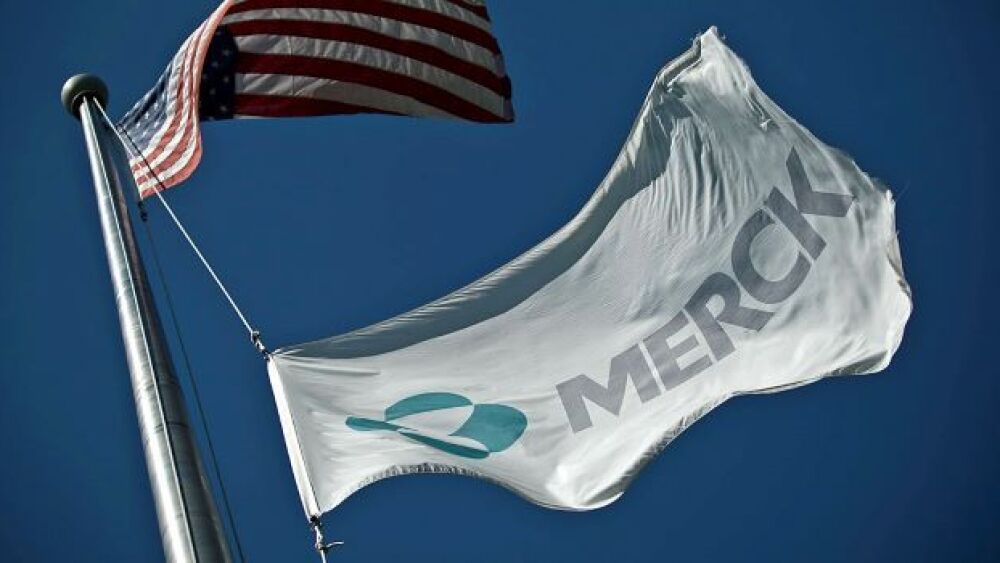Merck’s Keytruda appeared to outperform GSK’s Jemperli in a key endometrial cancer patient subgroup, based on late-stage data revealed Monday during the Society of Gynecologic Oncology 2023 Annual Meeting.
Pictured: Merck company flag/Courtesy of Getty Images, Kena Betancur
Merck’s Keytruda (pembrolizumab) appeared to outperform GSK’s Jemperli (dostarlimab) in a key endometrial cancer patient subgroup, based on late-stage data revealed Monday during the Society of Gynecologic Oncology (SGO) 2023 Annual Meeting.
In the Phase III RUBY study, GSK tested Jemperli and standard chemotherapy in 494 patients with primary advanced or recurrent endometrial cancer.
After two years of follow-up, Jemperli improved progression-free survival (PFS) by 72% in patients with mismatch repair-deficient (dMMR) or microsatellite instability-high (MSI-H) cancers, as compared with placebo.
Merck’s Keytruda had a similarly impressive performance in the Phase III NRG-GY018 study, leading to a 70% PFS improvement relative to placebo in dMMR patients at a median follow-up of 12 months.
However, Merck had a stronger showing in the subgroup of MMR-proficient (pMMR) patients. At 12 months, Keytruda cut the risk of disease progression or death by 46%, while Jemperli achieved a 24% reduction over 24 months of follow-up.
Neither RUBY nor NRG-GY018 were head-to-head trials, and fundamental differences make cross-study comparisons inconclusive. For example, Merck’s trial occurred in one part and enrolled patients with measurable stage III, IVA, IVB or recurrent cancers.
Meanwhile, RUBY had two sequential parts: one testing Jemperli alone and another in combination with Zejula (niraparib). GSK’s trial also enrolled a broader patient population including approximately 10% with carcinosarcoma and 20% with serous carcinoma, both of which are known to be aggressive.
Lyndsay Meyer, director, U.S. corporate communications at GSK, told BioSpace results from RUBY will serve as the basis for regulatory submissions, anticipated in the first half of 2023.
Still, because of its relatively weaker performance in pMMR patients, GSK might have difficulty challenging Merck’s dominance in endometrial cancer.
Jemperli Runs Slightly Behind
Keytruda won its first approval in September 2019 as a combination treatment with Eisai’s Lenvima (lenvatinib) for patients who were not dMMR or MSI-H.
The blockbuster drug has since picked up two more approvals in endometrial cancer. Keytruda is also approved for several other cancers, including melanoma, gastric and non-small cell lung cancer (NSCLC). This deep and diverse list of indications has allowed Keytruda to bring in $20.9 billion in 2022, up 22% from the year before.
Jemperli, in comparison, entered the endometrial cancer space two years later, in April 2021, when it notched the FDA’s nod for recurrent or advanced, dMMR-positive disease. In 2022, Jemperli earned nearly $26 million for GSK and was its third best-performing oncology asset.
GSK did score a win over Merck in December 2022 when Jemperli edged out Keytruda in a head-to-head mid-stage trial in metastatic non-squamous NSCLC. In the Phase II PERLA trial, Jemperli induced a 46% objective response rate, compared to 37% in the Keytruda arm. PERLA tested both treatments with chemotherapy as a first-line recourse for this indication.
This article has been updated with comments from GSK. BioSpace has also contacted Merck.






